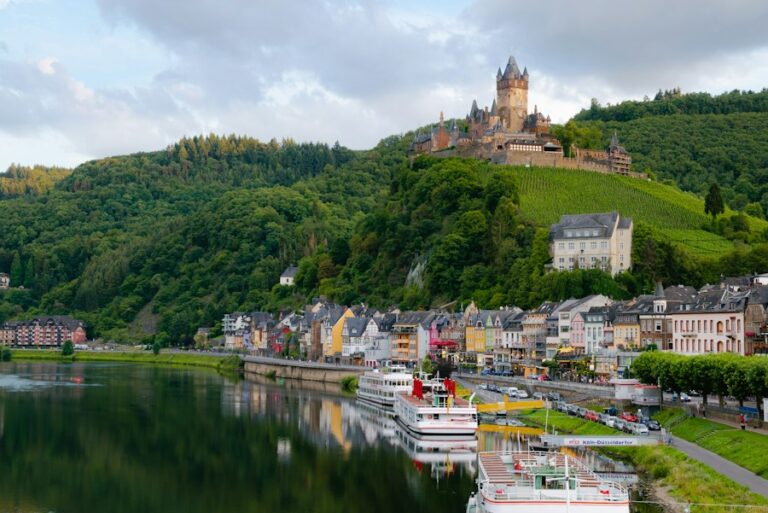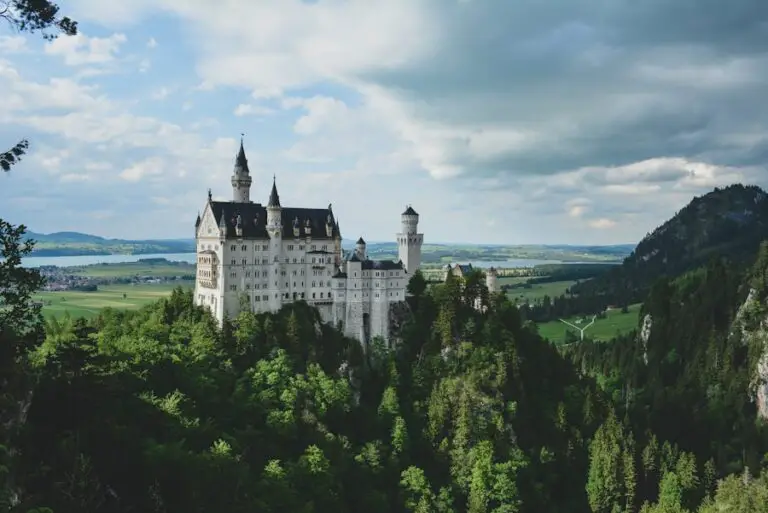Raise a Stein to Tradition: Exploring the Rich History of German Beer Festivals
German beer festivals are renowned worldwide for their lively atmosphere, delicious brews, and rich cultural traditions. These festivals, such as Oktoberfest, have become iconic symbols of German culture and are a must-visit for beer enthusiasts and travelers alike. The significance of German beer festivals lies not only in the celebration of beer itself but also in the deep-rooted traditions, history, and sense of community that they embody.
German beer festivals are more than just an opportunity to indulge in a pint or two; they are a celebration of German heritage and a chance to experience the country’s vibrant culture firsthand. From the lively music and traditional dances to the mouthwatering food and camaraderie among festival-goers, these events offer a unique glimpse into the heart and soul of Germany.
The Origins of Oktoberfest: A Brief History
The origins of Oktoberfest can be traced back to 1810 when Crown Prince Ludwig of Bavaria married Princess Therese von Sachsen-Hildburghausen. To celebrate their wedding, the citizens of Munich were invited to join in the festivities held on the fields in front of the city gates. The event was such a success that it was decided to repeat it annually, giving birth to what is now known as Oktoberfest.
Over the years, Oktoberfest has evolved from a small wedding celebration into the world’s largest beer festival. Today, it attracts millions of visitors from around the globe who come to Munich to partake in the festivities. The festival now spans over two weeks and features not only beer but also amusement rides, traditional Bavarian music, parades, and various cultural events.
The Role of Beer in German Culture and Society
Beer holds a special place in German culture and society. It is not just a beverage; it is an integral part of daily life and social gatherings. In fact, Germany has a long-standing brewing tradition that dates back centuries, and the country is known for producing some of the finest beers in the world.
Beer is deeply ingrained in German society, and it is often enjoyed in moderation as a way to relax, socialize, and bond with friends and family. It is common to see people enjoying a beer at beer gardens, pubs, or even in public parks. In addition to its social aspect, beer is also seen as a symbol of German craftsmanship and quality.
The Importance of Traditional Bavarian Clothing at Beer Festivals
One of the most iconic aspects of German beer festivals is the traditional Bavarian clothing worn by festival-goers. Men typically don lederhosen, which are leather shorts or pants, paired with a checkered shirt and suspenders. Women, on the other hand, wear dirndls, which are traditional dresses with a fitted bodice, full skirt, and apron.
The tradition of wearing traditional Bavarian clothing at beer festivals dates back to the 19th century when it was common attire for rural workers. Today, it has become a symbol of German identity and pride. Wearing traditional clothing not only adds to the festive atmosphere but also allows visitors to fully immerse themselves in the cultural experience.
The Famous Beer Tents of Oktoberfest: What to Expect
Oktoberfest is famous for its massive beer tents, each offering a unique atmosphere and selection of brews. There are over 30 large beer tents at the festival, each operated by a different Munich brewery. These tents can accommodate thousands of people and are filled with long wooden tables and benches where festival-goers can sit and enjoy their beers.
When visiting a beer tent at Oktoberfest, expect to be greeted by lively music from traditional Bavarian bands known as oompah bands. The atmosphere is festive and energetic, with people singing along to popular songs and dancing on the benches. It is a true celebration of German culture and a chance to make new friends from around the world.
The Best German Beers to Try at Beer Festivals
German beer is renowned for its quality and variety, and beer festivals provide the perfect opportunity to sample some of the best brews the country has to offer. There are several types of German beers to try, each with its own unique flavor profile and brewing tradition.
One of the most popular styles is the Märzen, which is a malty and full-bodied beer traditionally brewed for Oktoberfest. Another classic German beer is the Weissbier, or wheat beer, which is known for its refreshing and fruity taste. Other notable styles include Pilsner, Bock, and Dunkel.
When attending a German beer festival, be sure to try a variety of beers to fully appreciate the range of flavors and brewing techniques. Don’t be afraid to ask the friendly festival staff for recommendations or try something new – you may discover your new favorite brew.
The Food of German Beer Festivals: Sausages, Pretzels, and More
No German beer festival would be complete without indulging in some traditional festival foods. From hearty sausages to soft pretzels and everything in between, German cuisine offers a wide array of delicious treats that pair perfectly with a cold pint of beer.
One of the most iconic foods at German beer festivals is the bratwurst, a type of sausage made from pork or beef. These sausages are typically grilled and served with sauerkraut or mustard. Another popular dish is the pretzel, which is a soft and chewy bread product that pairs well with beer.
Other traditional festival foods include schnitzel, a breaded and fried meat cutlet, and käsespätzle, a type of egg noodle dish topped with melted cheese. For those with a sweet tooth, don’t miss out on trying a slice of apple strudel or a traditional Bavarian cream pastry.
The Music of Beer Festivals: Oompah Bands and Folklore
The music at German beer festivals is an essential part of the experience and adds to the festive atmosphere. Traditional Bavarian music is characterized by lively oompah bands, which typically consist of brass instruments such as trumpets, tubas, and trombones, as well as accordions and drums.
Oompah bands play a mix of traditional German folk songs, polkas, and popular tunes that get festival-goers on their feet and dancing. The music is infectious and creates a sense of camaraderie among the crowd. It is not uncommon to see people linking arms and swaying to the rhythm of the music.
In addition to oompah bands, many beer festivals also feature live performances by popular German bands and artists. These performances often attract large crowds and add an extra level of excitement to the festivities.
Other Popular German Beer Festivals You Should Know About
While Oktoberfest may be the most famous German beer festival, there are several other notable events that beer enthusiasts should know about. These festivals offer a unique experience and showcase the diverse brewing traditions and regional specialties found throughout Germany.
One such festival is the Cannstatter Volksfest in Stuttgart, which is often referred to as the “second Oktoberfest.” This festival features a wide variety of beers, amusement rides, and cultural events. Another popular event is the Frühlingsfest in Munich, which takes place in spring and offers a more relaxed and family-friendly atmosphere.
Other notable beer festivals include the Karneval der Kulturen in Berlin, which celebrates cultural diversity through music, dance, and food, and the Bergkirchweih in Erlangen, which is one of the oldest beer festivals in Germany. Each of these festivals has its own unique charm and should not be missed.
The Future of German Beer Festivals: Modernization and Innovation
German beer festivals have a long and storied history, but they are not immune to modernization and innovation. As the world changes, so do these festivals, adapting to new trends and technologies while still preserving their cultural traditions.
One example of modernization in German beer festivals is the use of cashless payment systems. Many festivals now offer wristbands or cards that can be loaded with money and used to purchase food and drinks, eliminating the need for cash transactions. This not only streamlines the process but also reduces the risk of theft or loss.
Another trend is the incorporation of craft beers into traditional beer festivals. While German breweries have a long-standing tradition, craft beer has gained popularity in recent years, and many festivals now feature a dedicated area where visitors can sample a wide variety of craft brews.
Why German Beer Festivals are Worth Experiencing
In conclusion, German beer festivals are more than just an opportunity to enjoy a pint or two; they are a celebration of German culture, history, and community. These festivals offer a unique glimpse into the heart and soul of Germany, allowing visitors to immerse themselves in the vibrant atmosphere, traditional music, delicious food, and, of course, world-class beers.
Whether it’s Oktoberfest in Munich or one of the many other beer festivals throughout Germany, experiencing these events is a must-do activity for any beer enthusiast or traveler. The significance of German beer festivals lies in their ability to bring people together, foster a sense of camaraderie, and create lasting memories. So raise your stein, don your lederhosen or dirndl, and join in the festivities – you won’t be disappointed. Prost!
Do you have questions about Germany? then contact us by using our Contact Me page. Checkout more posts by us on our Blog.






